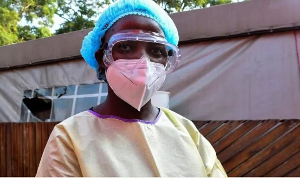The Director of ResourceTrust Network (RTN), an NGO, Joseph William Osei says with the upsurge in climate change and fragmentation of land, there is the need for a resilient landscape for Agricultural production systems to make smallholder farmers more relevant in the production chain.
The call stems from the fact that Smallholder Agriculture has survived over the years and continues to play a critical role in the Agricultural commodity supply chains even with the introduction of Industrial Agriculture.
Mr. William Osei was facilitating a day's training workshop for a cross-section of Smallholder farmer producers in rubber and oil palm plantations from the Cape Three Point enclave at Agona-Nkwanta in the Ahanta West Municipality of the Western Region.
It was organized by RTN in conjunction with the Ghana Wildlife Society (GWS) with funding from the Critical Eco-System Partnership Fund (CEPF) and the Guinea Forests of West Africa Hotspot Programme managed by Birdlife International.
The purpose of the workshop was to facilitate participation among key Smallholder plantation actors to deliberate on Smallholder plantation sustainable production solutions and be inspired to collaborate and contribute to supporting Smallholder implementation of sustainability solutions.
It also seeks to get rubber and oil palm Smallholders, their large scale commercial counterparts and local government to jointly support Smallholder plantations to achieve sustainable livelihoods and cooperate profitability.
Mr. William Osei said his outfit in collaboration with other bodies, would move all out to create and enabling environment for smallholder systems to reap the benefit of agricultural conservation systems in both the forest and farming systems.
He noted that Plantation Agriculture among other land use activities is the main source of livelihood for farming communities within the Cape Three Points conservation corridor which has been the main driver of deforestation.
The situation, he said, had contributed to habitat damage, fragmentation, loss of bio-diversity thereby impacting negatively on ecological functions.
It came to the fore during the workshop that given the critical role of Smallholder plantations in household livelihoods, contribution to local development, stable commodity supply and cooperate profitability, key actors were tasked to ensure the sustainability of Smallholder plantations and their benefits.
The workshop brought together stakeholders in the industry such as the Ghana Rubber Estate Limited (GREL), NORPALM, NGOs and farmers to contribute and collaborate for sustainable Agricultural production systems to conserve bio-diversity.
He also stressed on co-creation of all actors in Smallholder farming activities to make farming activities more relevant in contemporary times.
The Ahanta West Municipal Director of the Ministry of Food and Agriculture (MOFA), who was represented by Mr. Albert Bonney pledged government's preparedness to assist small scale farmers in the quest for food security and sufficiency and deal with famine as it happened in 1983.
To this end, it is the intention of government to build more warehouses to store more food and also create more jobs for the people especially the youth.
Mr. Bonney said most smallholder farmers have been supplied with fertilizers to boost crop production to increase growth and national income.
He said under the government's planting for export development, MOFA in collaboration with NORPALM have targeted 30,000 oil palm seedlings free for farmers.
About 200,000 plantation seedlings are expected to be given to farmers in 2019.
Mr. Bonney siad MOFA was in constant touch with RTN to educate farmers on climate smart Agriculture to deal with the climate change phenomenon.
He also assured farmers of unified extension services to make Agricultural inputs available to farmers and assist farmers with new varieties to grow more food, increase yield and reduce poverty.
The Project Director of GREL, Mr. Simon Tetteh said all actors must team up with farmers and traditional rulers around the forest belt to protect the forest.
He identified bio-diversity connectivity as the ultimate goal to ensure a sustainable forest conservation and sustainability.
Mr. Tetteh said GREL has ensured that under its dashboard out-growers initiative, benefits must accrue to farmers.
He disclosed that GREL had employed 18,024 workers to deal with the unemployment situation and boost the local economy.
During an open forum, the workshop called for a common marketing platform for smallholder farmers a well as international market prices given to rubber plantation farmers.
They also called for buffer zones for planting trees around rubber and oil palm plantations.
Business News of Tuesday, 25 December 2018
Source: Daniel Kaku

















